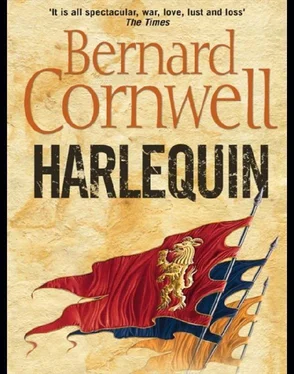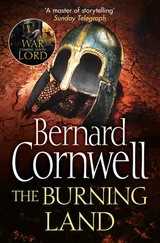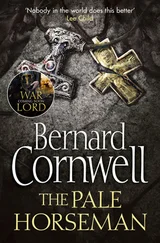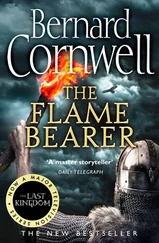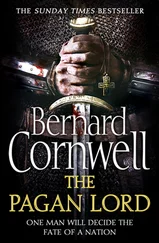The archers were hacking at the unsaddled horsemen. One of the fallen men screamed as the blades chopped at his arms and trunk. The blue and yellow surcoats were soaked in blood. Then Thomas saw that it was not yellow stars on a blue field, but hawks. Hawks with their wings raised and their claws outstretched. Sir Guillaume d'Evecque's men! Maybe Sir Guillaume himself! But when he looked at the grimacing, blood-spattered faces Thomas saw that all three had been young men. But Sir Guillaume was here in Caen, and the lance, Thomas thought, must be near. He broke through the fence and headed down another alley. Behind him, in the house that the hobelars had commandeered, a woman cried, the first of many. The church bells were falling silent. Edward the Third, by the Grace of God, King of England, led close to twelve thousand fighting men and by now a fifth of them were on the island and still more were coming. No one had led them there. The only orders they had received were to retreat. But they had disobeyed and so they had captured Caen, though the enemy still held the bridge barbican from where they were spitting crossbow bolts.
Thomas emerged from the alley into the main street, where he joined a group of archers who swamped the crenellated tower with arrows and, under their cover, a howling mob of Welsh and English overwhelmed the Frenchmen cowering under the barbican's arch before charging the defenders of the bridge barricade, who were now assailed on both sides. The Frenchmen, seeing their doom, threw down their weapons and shouted that they yielded, but the archers were in no mood for quarter. They just howled and attacked. Frenchmen were tossed into the river, and then scores of men hauled the barricade apart, tipping its furniture and wagons over the parapet.
The great mass of Frenchmen who had been waiting behind the barbican scattered into the island, most, Thomas assumed, going to rescue their wives and daughters. They were pursued by the venge-ful archers who had been waiting at the bridge's far side, and the grim crowd went past Thomas, going into the heart of the Ile Saint Jean where the screams were now constant. The cry of havoc was every-where. The barbican tower was still held by the French, though they were no longer using their crossbows for fear of retaliation by the English arrows. No one tried to take the tower, though a small group of archers stood in the bridge's centre and stared up at the banners hanging from the ramparts.
Thomas was about to go into the island's centre when he heard the clash of hooves on stone and he looked back to see a dozen French knights who must have been concealed behind the barbican. Those men now erupted from a gate and, with visors closed and lances couched, spurred their horses towards the bridge. They plainly wanted to charge clean through the old city to reach the greater safety of the castle.
Thomas took a few steps towards the Frenchmen, then thought better of it. No one wanted to resist a dozen fully armoured knights. But he saw the blue and yellow surcoat, saw the hawks on a knight's shield and he unslung his bow and took an arrow from the bag. He hauled the cord back. The Frenchmen were just spurring onto the bridge and Thomas shouted, Fvecque! Evecque!“ He wanted Sir Guillaume, if it was he, to see his killer, and the man in the blue and yellow surcoat did half turn in the saddle though Thomas could not see his enemy's face because the visor was down. He loosed, but even as he let the cord snap he saw that the arrow was warped. It flew low, smacking into the man's left leg instead of the small of his back where Thomas had aimed. He pulled a second arrow out, but the dozen knights were on the bridge now, their horses” hooves striking sparks from the cobbles, and the leading men lowered their lances to batter the handful of archers aside, and then they were through and galloping up the further streets towards the castle. The white-fledged arrow still jutted from the knight's thigh where it had sunk deep and Thomas sent a second arrow after it, but that one vanished in the smoke as the French fugitives disappeared in the old city's tight streets. The castle had not fallen, but the city and the island belonged to the English. They did not belong to the King yet, because the great lords, the earls and the barons, had not captured either place. They belonged to the archers and the hobelars, and they now set about plundering the wealth of Caen.
The Ile Saint Jean was, other than Paris itself, the fairest, plumpest and most elegant city in northern France. Its houses were beautiful, its gardens fragrant, its streets wide, its churches wealthy and its citizens, as they should be, civilized. Into that pleasant place came a savage horde of muddy, bloody men who found riches beyond their dreams. What the hellequin had done to countless Breton villages was now visited on a great city. It was a time for killing, for rape and wanton cruelty. Any Frenchman was an enemy, and every enemy was cut down. The leaders of the city garrison, magnates of France, were safe in the upper floors of the barbican tower and they stayed there until they recognized some English lords to whom they could safely surrender, while a dozen knights had escaped to the castle. A few other lords and knights managed to outgallop the invading English and flee across the island's southern bridge, but at least a dozen titled men whose ransoms could have made a hundred archers rich as princelings were cut down like dogs and reduced to mangled meat and weltering blood. Knights and men-at-arms, who could have paid a hundred or two hundred pounds for their freedom, were shot with arrows or dubbed down in the mad rage which possessed the army. As for the humbler men, the citizens armed with lengths of timber, mattocks or mere knives, they were just slaughtered. Caen, the city of the Conqueror that had become rich on English plunder, was killed that day and the wealth of it was given back to Englishmen.
And not just its wealth, its women too. To be a woman in Caen that day was to be given a foretaste of hell. There was little fire, for men wanted the houses to be plundered rather than burned, but there were devils aplenty. Men begged for the honour of their wives and daughters, then were forced to watch that honour being trampled. Many women hid, but they were found soon enough by men accustomed to riddling out hiding places in attics or under stairs. The women were driven to the streets, stripped bare and paraded as trophies. One merchant's wife, monstrously fat, was harnessed to a small cart and whipped naked up and down the main street which ran the length of the island. For an hour or more the archers made her run, some men laughing themselves to tears at the sight of her massive rolls of fat, and when they were bored with her they tossed her into the river where she crouched, weeping and calling for her children until an archer, who had been trying out a captured crossbow on a pair of swans, put a quarrel through her throat. Men laden with silver plate were staggering over the bridge, others were still searching for riches and instead found ale, cider or wine, and so the excesses grew worse. A priest was hanged from a tavern sign after he tried to stop a rape. Some men-at-arms, very few, tried to stem the horror, but they were hugely out-numbered and driven back to the bridge. The church of Saint Jean, which was said to contain the fingerbones of Saint John the Divine, a hoof of the horse Saint Paul was riding to Damascus and one of the baskets that had held the miraculous loaves and fishes, was turned into a brothel where the women who had fled to the church for sanctuary were sold to grinning soldiers. Men paraded in silks and lace and threw dice for the women from whom they had stolen the finery.
Thomas took no part. What happened could not be stopped, not by one man nor even by a hundred men. Another army could have quelled the mass rape, but in the end Thomas knew it would be the stupor of drunkenness that would finish it. Instead he searched for his enemy's house, wandering from street to street until he found a dying Frenchman and gave him a drink of water before asking where Sir Guillaume d'Evecque lived. The man rolled his eyes, gasped for breath and stammered that the house was in the southern part of the island. You cannot miss it , the man said, it is stone, all stone, and has three hawks carved above the door." Thomas walked south. Bands of the Earl of Warwick's men-at-arms were coming in force to the island to restore order, but they were still struggling with the archers close to the bridge, and Thomas was going to the southern part of the island which had not suffered as badly as the streets and alleys closer to the bridge. He saw the stone house above the roofs of some plundered shops. Most other buildings were half-timbered and straw-roofed, but Sir Guillaume d'Evecque's two-storey mansion was almost a fortress. Its walls were stone, its roof tiled and its windows small, but still some archers had got inside, for Thomas could hear screams. He crossed a small square where a large oak grew through the cobbles, strode up the house steps and under an arch that was surmounted by the three carved hawks. He was surprised by the depth of anger that the sight of the escutcheon gave him. This was revenge, he told himself, for Hookton.
Читать дальше
Конец ознакомительного отрывка
Купить книгу
